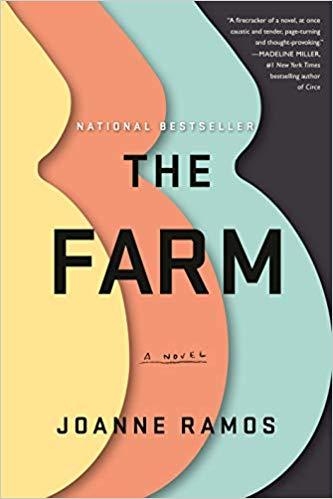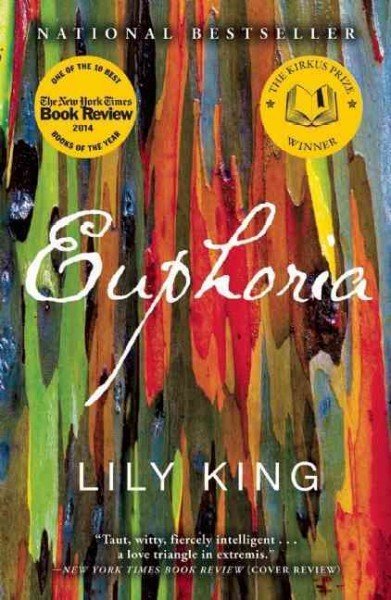#national bestseller
The Farm
by Joanne Ramos
At one day past my due date, I am currently in either the best or the worst position to review Joanne Ramos’ thought-provoking page-turner The Farm.
At the moment, the slightly-too-plausible premise of farming out pregnancies via pricey surrogacy does not seem so bad. Having endured morning sickness occurring all times of day that does not cease after 1st trimester, exhaustion tantamount to being hit repeatedly by a bus, never-ending constipation and pains in places I didn’t know existed, might I hire someone to trade places? Tell me where to VENMO.
And yet, in a way, this isn’t even what The Farm is about. The bookstore employee suggested it was like The Handmaid’s Tale, perhaps in an effort to warn my obviously gestating self that it might not be the best time to read it. In fact, it is only really like The Handmaid’s Tale in that there are pregnant women at its center.
It’s also not about the price of motherhood, the high-achieving women who are penalized at work for having children, nor about the fact that the US is the only developed country without paid maternity leave. These topics could have doubled the size of the book - and I would have gladly read more.
WhatThe Farm is about is far more personal and insidious - a sort of collective history and culpability woven into the fabric of the American flag - Betsy Ross stitching in her trinity kitchen all the while going blind.
The story follows Jane, a young Fiipina mother, trying to survive in NY. Her cousin presents her with an opportunity: interview at Golden Oaks, a resort-style surrogate facility, where the wealthiest clients pay top dollar to outsource their pregnancies. The facility provides comprehensive nutrition, weekly prenatal massages, yoga, wellness tracking and …alpacas. There she meets Reagan and Lisa, two caucasian “hosts,” who pull her into their orbit. With the payouts for healthy babies so huge, each “host” has her own reasons for signing up for 10 (yes, look up how long pregnancy actually is) months of incarceration, so to speak.
In addition to a brilliantly-paced speculative fiction thriller, what starts to unfold is a social commentary about opportunity, access, immigration, and skin tone. And by the end of the novel, as Jane marvels at her own brave smart daughter, I start to wonder about the American Dream - who has been duped and who is benefitting from doing the duping. We expect it to pay its dividends in one lifetime. Come “your huddled masses yearning to breathe free” not well,…three generations down the road. And when my own great-grandmother emigrated, gnawed family photo in hand, I wonder if she ever thought about three - and any day now, four - generations down the line, and where her sea voyage would lead.
And perhaps it’s not that the American Dream is dead - perhaps we just always thought it was free. What if it’s always been pricey? And the questions are: how much are you willing to sell?Andhow much are you willing to pay?
Let the bidding begin.
Post link
Euphoria by Lily King
I did not anticipate a tale about three anthropologists mired in the tribal cultures of 1930s New Guinea to be a one-sitting read. As you may have garnered from reading my other blog posts, I am often wrong.
I should have known from anthropologist Nell’s observation about half way through that things were bound to end painfully, but I simply couldn’t stop myself. She says, “Tragedy is based on this sense that there’s been a terrible mistake, isn’t it?” (140). And there is some terrible mistake, but who made it exactly, I’m not entirely sure. Was it one of the three scientists triangulated against the others? Was it of timing? Of place? Of circumstance? Or was it a mistake of more innate inevitability, of humanity, a mistake we ourselves didn’t make, but are doomed to pay for forever.
That inevitability, as tangible as it was, pulled me through the pages. Navigating the river for hours in the oppressive heat and blackness, plagued by bugs and desolation in equal measures, the anthropologist Bankson notes: “Sometimes at night it seemed to me that my boat was not being pushed by the engine but that boat and engine both were being pulled by the river itself, the ripples of wake just a design, like a stage set moving along with us” (38).
This is exactly how the novel drew me mercilessly onward, slapping at pesky and painful bugs, forcing in fetid thick air when it got difficult to breathe, like an anthropologist myself, determinedly highlighting passages I was hoping would uncover some mystery to the book or humanity, I’m not sure which.
If Virginia Woolf had written Heart of Darkness, with editing by Jennifer Egan of a visit from the goon squad, the result might be this book. Yesterday evening, discovering I had turned the final page, I groaned - out of pain, or satisfaction, or surprise. I’m not sure which. And maybe I found that place of “euphoria” where Nell says you think you know everything - but really you discover you know nothing.
Post link


